The City of Aurora is launching a program that would send mental health professionals to respond to certain 911 calls instead of police officers -- similar to a program in Denver that's seen success in keeping people from being arrested.
Aurora city spokesperson Cristal Dukes said the Aurora Mobile Response Team will launch on Wednesday. The team will include a clinician from the Aurora Mental Health Center and a paramedic from Falck Rocky Mountain.
City Councilmember Allison Hiltz said she had sought to bring this kind of program to Aurora for the last year after hearing about similar ones around the country. Mental health professionals would respond to 911 calls that involve mental health crisis situations. It would be up to the city's 911 dispatch center to flag calls more appropriate for the program to respond to.
Hiltz said her goal has been to bring more humane services to the city with an emergency response option that doesn't involve the police. It's a thought she said she's had even before a nationwide conversation about defunding of police departments was sparked after the murder of George Floyd last year.
"I think nationwide and in Aurora, especially, there is a lot of breakdown in trust between community and policing," Hiltz said. "It's not necessary to have a police officer in every call."
The pilot program will last six months. City lawmakers last year unanimously approved $160,000 to pay for the program. Hiltz said Falck will provide the vehicle for the two staffers.
Dukes said the program will operate on a limited basis from 10 a.m. to 7 p.m. from Wednesday to Saturday. The service will focus on the northwest part of the city. Hiltz said the area was chosen based on research by Falck on call volumes.
Hiltz worked with Vinnie Cervantes, who runs Denver Alliance for Street Health Response, to establish the program.
Cervantes said he wants to make sure people in Aurora have a say in how the program operates, which is a concern he's had Denver's Support Team Assisted Response program, better known as STAR. That program launched last summer and has responded to more than 1,600 calls since then. The city announced this week it would be expanding the program this month. Cervantes was also involved in that program's creation.
"We're definitely taking a lot of lessons from Denver in terms of what we've learned," Cervantes said. "That was one of our initial offerings to the City of Aurora, that we wanted to see some kind of community advisory body that we would also be part of."
Aurora's program will launch a week after grand jury indictments against three Aurora police officers and two paramedics involved in the violent arrest of Elijah McClain were made public. His death in August 2019 led to demonstrations last summer, and changes to state and local policy involving police. Hiltz said the timing was purely coincidental. She declined to speculate whether this program would have been applicable in McClain's case.
People will be able to contact Aurora's response team by calling 911 or calling Aurora's non-emergency dispatch line at 303-627-3100.














